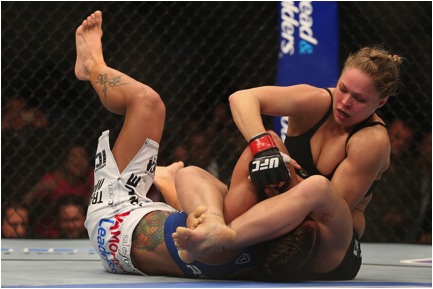Here’s How the UFC’s First Female MMA Fight Went, and Why It’s Been a Long Time Coming
Supergirly

This weekend wasn’t just the Oscars, it was also the first Ultimate Fighting Championship bout to feature two signed female MMA fighters. We’ve reported a bit on the progress of women in the mixed martial arts community to get the kind of billing their male peers get, but last week long-time MMA fan AshleyRose Sullivan offered to cover the fight for us and explain its milestone status.
On February 23rd, as Ronda Rousey and Liz Carmouche entered the ring at the sold-out The Honda Center in Anaheim, California, for UFC 157, Joe Rogan announced (over the sound of thousands of screaming fans) that, “This is a gigantic cultural moment!” He was right.
If you haven’t followed mixed martial arts, you might not know about the struggle women have had gaining notoriety in the sport. In spite of the occasional women’s MMA match in Japan in the 90’s and the introduction of women to smaller promotions like Strikeforce, EliteXC, and Bellator, (where, at first, women were made to fight shorter, two-minute rounds rather than the customary five) it seemed like the UFC, the most prominent MMA promotion in the world, would never get around to signing female fighters. UFC President, Dana White, even said, “Women will never fight in the UFC.” But, that all changed when Ronda Rousey hit the scene.
Rousey’s history as a fighter began in the sport of Judo. When she not only made it to the Beijing Olympics, but became the first American woman to medal in Judo, Rousey cemented her status as a serious athlete. Then, when she returned to the States, she found there weren’t many career opportunities for women who had dedicated their lives to throwing people down really good. She took a job as a bartender and waitress in Los Angeles.
Eventually, she discovered and started training in mixed martial arts. Rousey won her first three amateur fights in the first round, by armbar. She then signed with Tuff-N-Uff where she won her next two fight in the first round, by armbar. Then came her first professional fight, with King of the Cage, where she submitted Ediane Gomes in the first round, by armbar. If you see a pattern developing here, you aren’t the only one. Rousey’s consecutive first-round, armbar submissions were becoming the talk of the MMA town. When she signed with Strikeforce, her first big promotion, everyone wondered whether she could do it again. She did. She defeated Sara D’Alelio, took the belt from Meischa Tate, and defended it against Sara Kaufman all with first-round armbar submissions. Finally, Dana White was taking notice. In November 2012, Rousey was officially signed to the UFC. Now she just needed someone to fight.
That job fell to Liz Carmouche—reportedly the only woman willing to take the championship fight with Rousey. Carmouche, a former marine who served three tours of duty in the Middle East, not only has the distinction of participating in the first ever women’s UFC fight, she’s also the first openly gay UFC fighter.
Carmouche didn’t finish her stint in the marines until three years after the repeal of “Don’t Ask, Don’t Tell,” and said that, “I constantly had to look over my shoulder, always wondering if someone was going to try and out me.” And, while her time in the military was difficult, she credits the experience with giving her the strength and mental toughness she has today. Both of those traits would be utilized in her fight with Ronda Rousey.
The buildup to any fight is intense, with constant training and dieting to make weight, but this fight had the added pressure of unprecedented media attention. Many had wondered whether UFC President, Dana White, would expend the same resources promoting UFC 157 and its first female fighters as it had other title fights. As it turned out, we saw as much or more of Rousey and Carmouche as any other big-name fighter before Saturday night. Even after UFC-sponsored promotion activities started, larger outlets like Time Magazine, and HBO were suddenly featuring the story. These women were inundated with interviews and visits from camera crews.
On Saturday night, both women entered the Octagon for a five-round, championship battle. Almost immediately, Carmouche had Rousey in trouble. A rear-naked choke turned into an ugly neck crank. It looked as though Rousey’s run as champion might come to an end but Rousey toughed it out, escaped, and they went to the ground. With only eleven seconds left in the first round, Rousey maneuvered Carmouche into an armbar and ended the fight—retaining her Bantamweight belt and her streak of consecutive first round armbar submissions.
The fight was fast-paced, technical, and had the sold-out arena on their feet. (I was also on my feet—in my living room.) It seemed as though Rousey and Carmouche had ushered in a new era of women’s mixed martial arts—one where they would finally be taken seriously as athletes and competitors. Dana White, who has always been concerned with whether or not there were enough female fighters or public interest to constitute a women’s division said, “This is, without a doubt, the most media attention we’ve ever had leading up to a fight,” and afterward came the announcement that White had signed ten female fighters to the UFC with five more on the way.
It looks like, thanks to Rousey and Carmouche, women have finally arrived in the UFC and they’re here to stay.
AshleyRose Sullivan hasn’t missed a major MMA event since 2006. In addition to following badass women in sports, she’s also a writer and full time geek. She’s watching all of Star Trek in a year and chronicling the adventure on her blog, My Year Of Star Trek.
Have a tip we should know? [email protected]